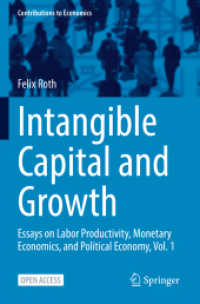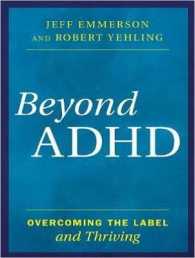- ホーム
- > 洋書
- > ドイツ書
- > Social Sciences, Jurisprudence & Economy
- > Social Sciences
- > social sciences in general
Full Description
This Brief revisits and extends Epstein's classical agent-based model of civil violence by considering important mechanisms suggested by social conflict theories. Among them are: relative deprivation as generator of hardship, generalized vanishing of the risk perception ('massive fear loss') when the uprisings surpass a certain threshold, endogenous legitimacy feedback, and network influence effects represented by the mechanism of dispositional contagion. The model is explored in a set of computer experiments designed to provide insight on how mechanisms lead to increased complexity of the solutions. The results of the simulations are compared with statistical analyses of estimated size, duration and recurrence of large demonstrations and riots for eight African countries affected by the "Arab Spring," based on the Social Conflict Analysis Database.
It is shown that the extensions to Epstein's model proposed herein lead to increased "generative capacity"of the agent-based model (i.e. a richer set of meaningful qualitative behaviors) as well the identification of key mechanisms and associated parameters with tipping points. The use of quantitative information (international indicators and statistical analyses of conflict events) allows the assessment of the plausibility of input parameter values and simulated results, and thus a better understanding of the model's strengths and limitations.
The contributions of the present work for understanding how mechanisms of large scale conflict lead to complexbehavior include a new form of the estimated arrest probability, a simple representation of political vs economic deprivation with a parameter which controls the `sensitivity' to value, endogenous legitimacy feedback, and the effect of network influences (due to small groups and "activists"). In addition, the analysis of the Social Conflict Analysis Database provided a quantitative description of the impact of the "Arab Spring" in several countries focused on complexity issues such as peaceful vs violent, spontaneous vs organized, and patterns of size, duration and recurrence of conflict events in this recent and important large-scale conflict process. This book will appeal to students and researchers working in these computational social science subfields.
Contents
Introduction.- Theoretical Foundations.- Review of ABM of Social Conflict & Violence.- Analysis of Conflict Datasets & Indicators.- Agent-Based Model of Social Conflict.- Conclusions.- Future Work.








